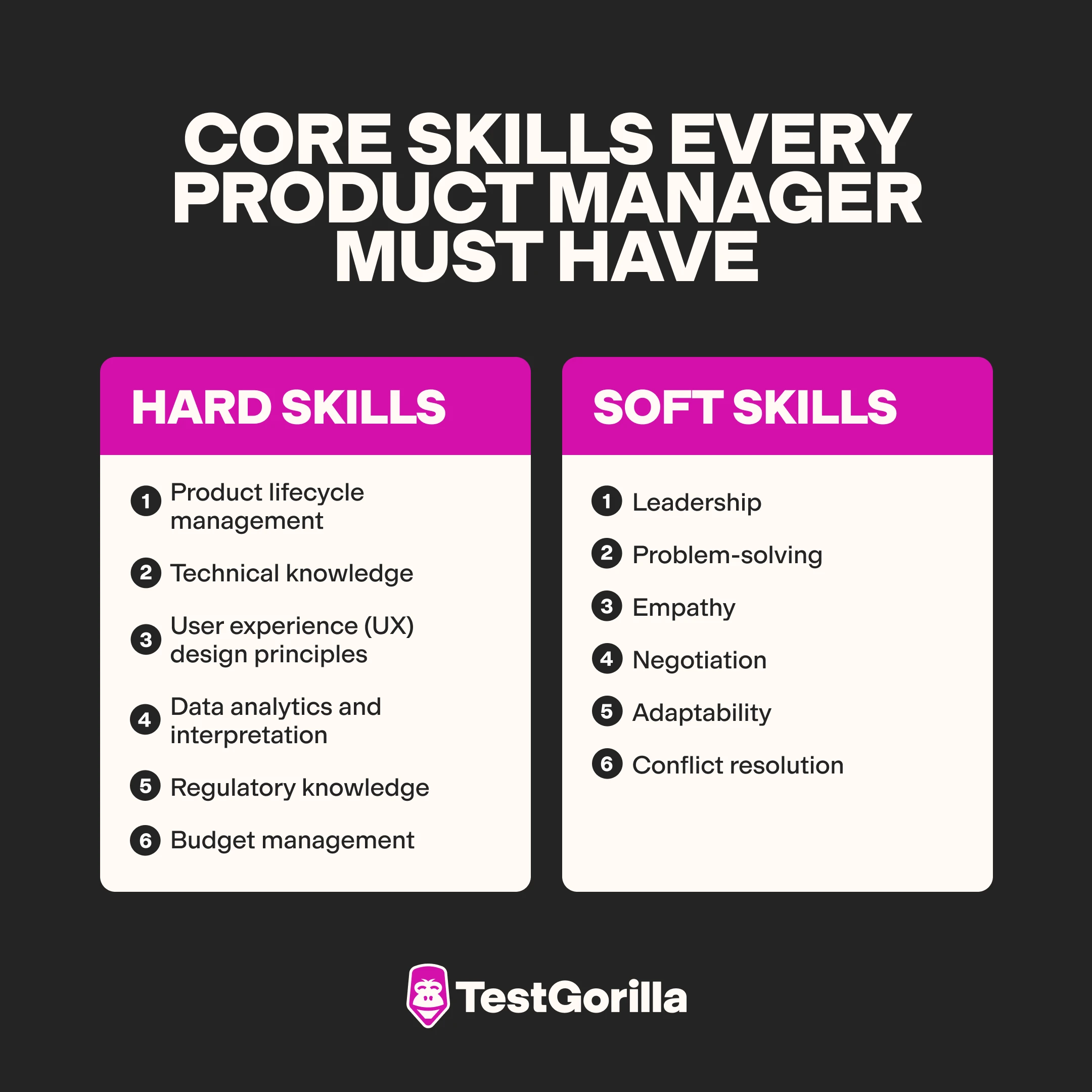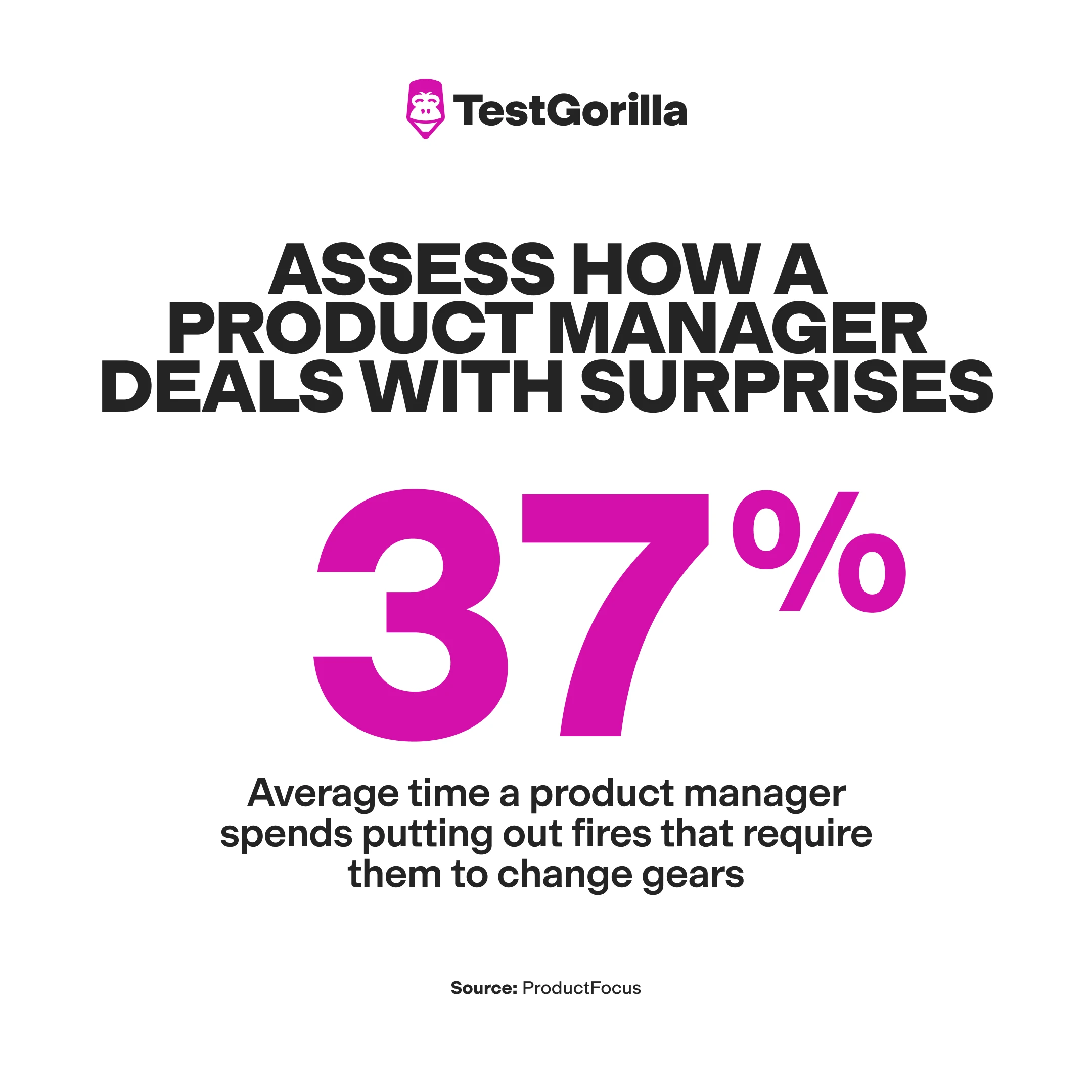Every year, tons of new products hit the shelves, but not all of them make it. The success stories? They’re usually the result of a skilled product manager's hard work. That's why choosing the right person for this role is crucial. But here's the catch: product managers need a wide range of skills.
If you're not sure which skills are key, you might end up with a dud product, a frustrated team, and money down the drain – a scenario no company wants to face.
Don't worry, though. Our guide is here to help. We walk you through what to look for in product manager candidates so you can hire a product manager who’s the real deal. Keep reading to learn more!
Table of contents
What is a product manager?
A product manager is the behind-the-scenes hero making sure your product hits the mark and shines in the market. They’re the ones who carve out the vision for your product, making sure it lines up perfectly with your business goals.
Every day, they're juggling tasks – figuring out which new features to develop, working with designers and engineers to bring these features to life, and diving into market trends to keep your product ahead of the curve.
But a product manager doesn’t work solo. For example, they work closely with the marketing team to craft the perfect go-to-market strategy. They also make sure the sales team knows the product's perks inside out. Plus, they’re always gathering feedback from customers to refine the product further.
Basically, they're the key player who keeps your product development on track and in tune with everyone involved, making sure every team and customer is taken care of. Thanks to their excellent communication skills and quick problem-solving, they do more than just manage products – they guide your company’s strategy, helping to draw in and keep customers.
Core skills every product manager must have
Here are the hard and soft skills every product manager needs to thrive.
Hard skills
These hard skills help your product manager effectively develop a successful product to go to market.
Product lifecycle management to map out each phase of your product’s development – planning, execution, and evaluation – and continually improve it.
Technical knowledge to understand the tech behind your product (if the product uses tech) so they can collaborate with your engineering team and set achievable development goals.
User experience (UX) design principles to make sure the product is easy to use and your customers will enjoy it.
Data analytics and interpretation using tools like Excel so they can spot trends and adjust your product strategy in ways that really move the needle.
Regulatory knowledge to ensure your product meets legal standards so you can avoid compliance issues.
Budget management so they can manage the product’s finances and keep the product development within budget.
Soft skills
These soft skills help product managers identify with your customers and help your team create a successful product.
Leadership to guide their teams through the product's journey, inspiring every member to achieve a common goal.
Problem-solving for tackling daily hurdles creatively – whether they must smooth out issues with resources, sooth stakeholder tensions, or fix sudden product glitches.
Empathy to put themselves in your customers’ shoes and make sure the product meets user needs.
Negotiation so they can hash out details with other departments to get the resources or timelines they need – like securing a feature’s launch ahead of a major industry event.
Adaptability so they can move with the market and make sure your product stays relevant as consumer tastes change or new competitors emerge.
Conflict resolution so they can deal with unexpected tension between teammates and keep product development moving smoothly.
How to assess product manager candidates
Assessing product manager candidates can be tricky since their role requires so many skills. The best way to cover all your bases is by using a mix of tests that measure their skills and other traits. This way, you can easily spot the candidates with the skills and traits you need.
TestGorilla’s platform makes this step easy. Our customizable talent assessments can help you find a candidate who can make sure your product outshines the competition. You can combine five tests, plus add your own questions.
Here are the steps you might take and the tests you might use.
Assess their hard skills first
Before addressing their soft skills, you want to make your product manager candidates have the practical skills they need to develop an outstanding product. You might use these tests:
Product Management test: This test checks if candidates have the know-how to handle a product from the drawing board to launch.
Entry-level coding tests: You might consider using our Python and JavaScript
coding tests to assess their basic knowledge of these languages. Even if they won't be coding, it’s good to know if they understand what your engineers are up to.
UX/UI Design test: This test helps you see if they grasp what your design team needs to deliver a great user experience.
Data analytics tests: Can they make sense of data trends to boost your product’s performance? Our tests in
Excel, Azure, AWS, Google CloudPlatform, or GA4 can help you find out!
Budgeting test: This test can help you see if they can manage budgets wisely to keep your productss profitable.
Then, test their soft skills
Soft skills are just as important for product managers. Consider using these TestGorilla tests to assess your candidates:
Leadership & People Management test: This test helps you see if your candidates can support, influence, and guide your product teams to success.
Problem Solving test: This evaluates how candidates tackle and resolve problems as they arise. It can clue you in to how well they’ll solve product-related problems. (Even better, add your own custom product-related questions to the test – and see how candidates answer.)
Communication (Intermediate) test: This test helps you see if they can communicate clearly. This way, you’ll know how well they can help everyone – from engineers to execs – understand their product vision.
Negotiation test: This test can help you understand their ability to strike deals with stakeholders that benefit both the product and the team.
Why do culture add assessments matter for product management?
Product managers are like the glue between different teams – engineering, marketing, customer success, you name it. If they’re a good culture fit, they’ll be able to gel well with these teams and help everyone work together smoothly. And if they’re a good culture add, they can bring something fresh to your company and spark new ideas.
This is why it’s a good idea to use a Culture Add test in your hiring process. The test will help you understand your product management candidates’ values and behaviors so you can pick the one who’ll be the best addition to your culture.
How behavioral interviews fill in the recruitment gaps
You won’t always find a test for every skill you want to assess. But you can ask product manager interview questions to get the information you need. Behavioral interview questions are especially helpful – they let you peek into how a candidate has handled situations in the past, which can help you see how they’ll manage future challenges. For instance, you might not find a test for adaptability, but you could ask:
"Can you describe a time when you had to change your product strategy based on new market information or feedback from stakeholders? How did you manage the transition, and what was the outcome?"
This question helps you understand how they deal with big shifts, apply new information, and lead their team through changes.
3 mistakes to avoid when assessing candidates
Avoid these common mistakes when assessing product managers.
1. Missing how they deal with surprises.
The average product manager spends up to 37% of their time putting out fires that require them to change gears. The world of product development can change in a heartbeat – new tech, shifting customer tastes, and more.
It’s tempting to just look at what a candidate has done when everything went according to plan. But, you must check how they handle things when they don’t go as expected. If you skip this, you might hire someone who’s only good when things are calm but struggles when the going gets tough.
2. Not assessing long-term strategic thinking
A big mistake when hiring product managers is not seeing how well they can think strategically. Product managers need to see the big picture. They shouldn’t just manage day-to-day tasks – they need to plan for the future of the product.
If you don't check whether a candidate can set long-term goals and come up with strategies to reach them, you might end up with someone who handles immediate tasks well but struggles to guide the product's overall direction and growth.
3. Not checking that they know industry-specific regulations
A big slip-up when hiring product managers is not making sure they know the rules that apply to your industry. This can lead to major legal headaches.
For instance, imagine you hire someone who doesn't get the ins and outs of data privacy in tech. You could end up with features that break privacy laws – landing your company in hot water and hurting your reputation.
FAQs
Here are some commonly asked questions.
Is product management an IT job?
Not really, but it can be. A product manager works on all kinds of products – from apps to shampoo. In tech companies, though, they'll definitely work a lot with the IT crowd to get digital products out the door.
Can you become a product manager without experience?
Yes, you can become a product manager without direct experience. This often involves starting in a related role, learning the ropes, and demonstrating skills like problem-solving and team coordination that are important product management. If you show an employer you’ve got what it takes – for example, by taking skills assessments – they might just hire you.
Find the ideal product manager for your team with TestGorilla
Hiring the right product manager is key to making sure your product meets market needs and drives your business forward. To do this, you must understand the skills they need – from product lifecycle management to leadership.
Hiring a candidate without the right skills can lead to missed opportunities and disjointed team efforts. TestGorilla provides the tools you need to assess these skills accurately and fairly – so you can find the best person for your team.
Ready to enhance your hiring process? Explore our extensive test library, schedule a demo, or sign up for a free account today to find the product manager you need.
Related posts
Hire the best candidates with TestGorilla
Create pre-employment assessments in minutes to screen candidates, save time, and hire the best talent.
Latest posts
The best advice in pre-employment testing, in your inbox.
No spam. Unsubscribe at any time.

Hire the best. No bias. No stress.
Our screening tests identify the best candidates and make your hiring decisions faster, easier, and bias-free.
Free resources
This checklist covers key features you should look for when choosing a skills testing platform
This resource will help you develop an onboarding checklist for new hires.
How to assess your candidates' attention to detail.
Learn how to get human resources certified through HRCI or SHRM.
Learn how you can improve the level of talent at your company.
Learn how CapitalT reduced hiring bias with online skills assessments.
Learn how to make the resume process more efficient and more effective.
Improve your hiring strategy with these 7 critical recruitment metrics.
Learn how Sukhi decreased time spent reviewing resumes by 83%!
Hire more efficiently with these hacks that 99% of recruiters aren't using.
Make a business case for diversity and inclusion initiatives with this data.





















